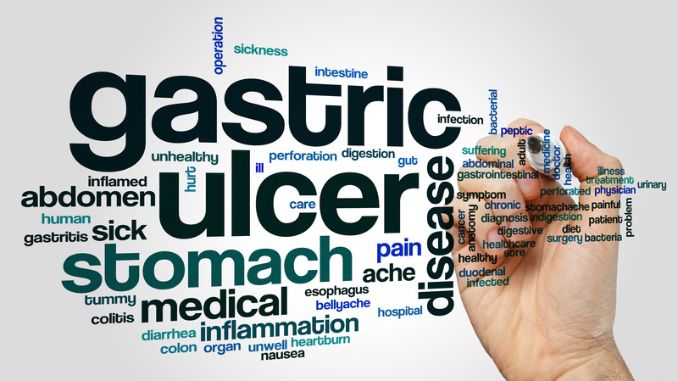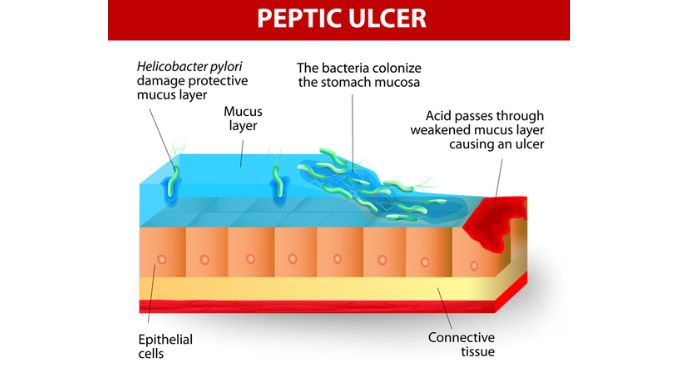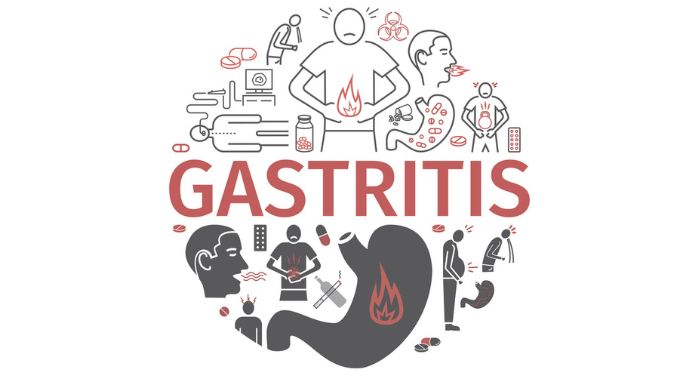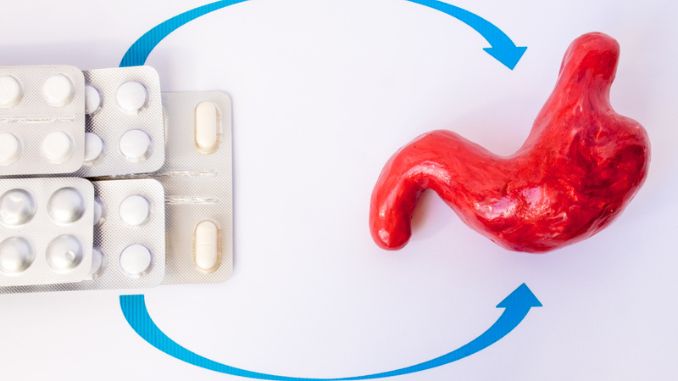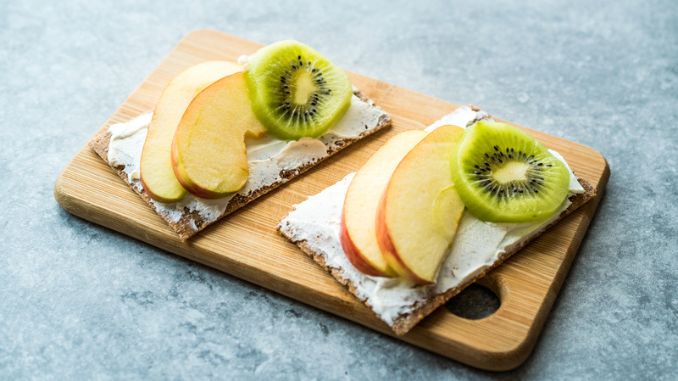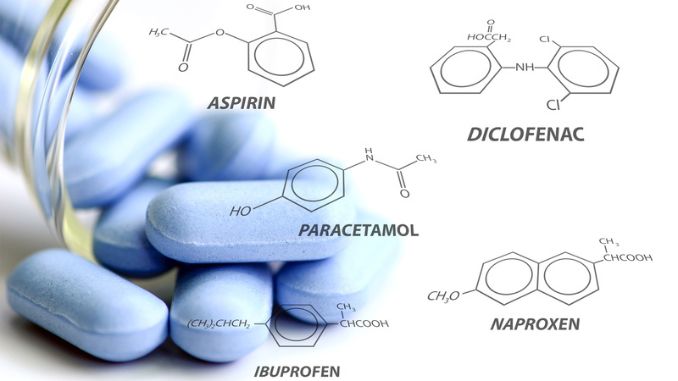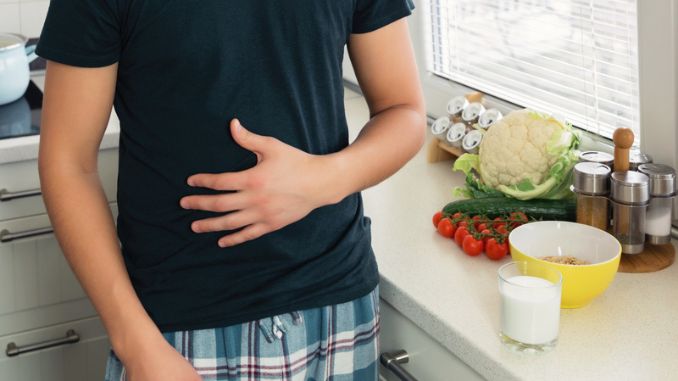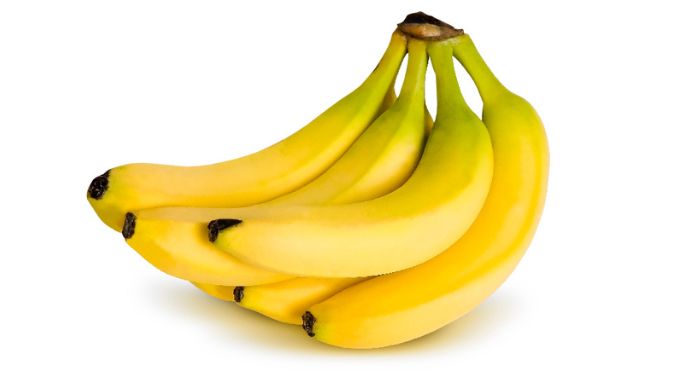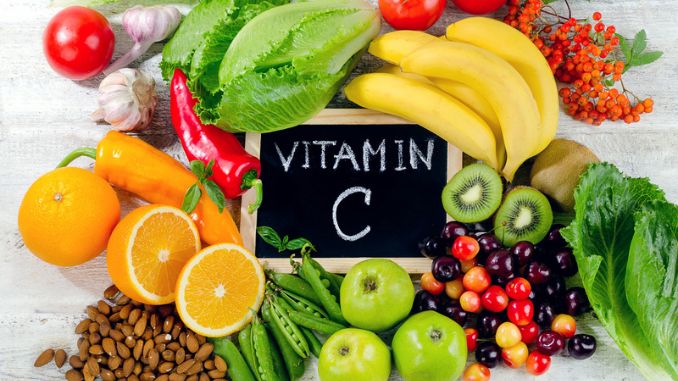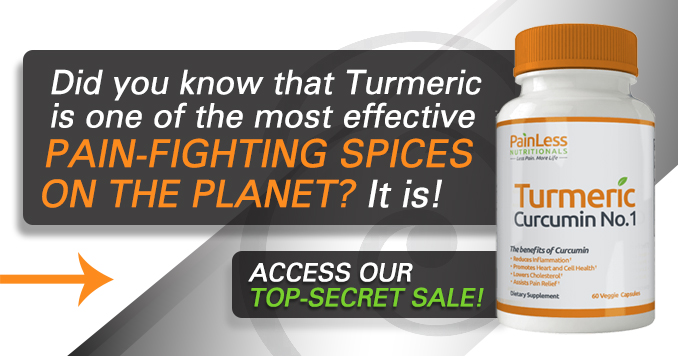Have you ever felt like there is a fire in your stomach? A burning sensation that doesn’t go away no matter what you do? If so, you may have gastritis or peptic ulcer disease. Gastritis and Peptic Ulcer Disease (PUD) are very different conditions. However, in both cases, a problem with your stomach wall can lead to severe complications if left untreated or improperly treated. So, don’t let this condition go unnoticed!
Gastritis is an inflammation of the stomach lining. On the other hand, peptic ulcer disease is painful sores or ulcers that develop in the stomach lining or the duodenum due to excessive production and storage of hydrochloric acid.
If you are diagnosed with gastritis or peptic ulcer disease, you might wonder what lifestyle changes you’ll need to make. While every case is unique, a few general tips can help make a living with these conditions easier. Please keep reading to learn more about gastritis and peptic ulcer disease, including their causes and treatment options.
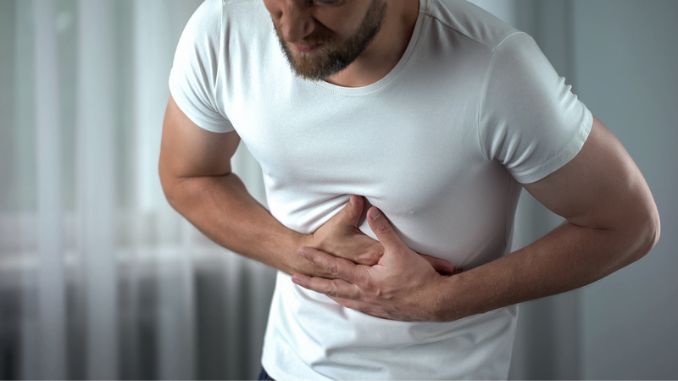
What Causes Gastritis and Peptic Ulcer Disease (PUD)?
In this day and age, where everyone is trying to watch what they eat and cut down on calories, it’s no wonder that cases of Gastritis and Peptic Ulcer Disease are rising. Although many mistakenly think these conditions are due to overeating or eating the wrong foods, there are various causes for these digestive disorders.
Gastritis: The stomach is a complex organ with many functions. Gastritis occurs when the cells that line your gut become swollen and begin to destroy tissue nearby because they believe there’s something beneficial near them – like food!
Peptic Ulcer Disease: The development of peptic ulcers results from some factors damaging the protective factors that line the stomach (gastric ulcer) and duodenum (duodenal ulcer). Contrary to popular opinion, over-secretion of gastric acid output is rarely a factor in gastric ulcers. Patients with gastric ulcers tend to secrete normal or even reduced levels of gastric acid. Recent studies focus on the bacteria Helicobacter pylori, stress, and non-steroidal anti-inflammatory drugs (NSAIDs) like aspirin and ibuprofen cause Peptic ulcers. Duodenal ulcers are four times more common in men than women and 4 to 5 times more common than gastric ulcers.
Symptoms of Gastritis and Peptic Ulcer Disease
Gastritis and Peptic Ulcers may have different causes but usually share many common symptoms. Both of these conditions can cause a great deal of discomfort, so it’s best to be able to identify them early on. If you’re experiencing any of the symptoms below, you must consult your doctor for an official diagnosis and treatment.
Peptic Ulcer Disease: Although symptoms of a peptic ulcer may be absent or quite vague, most peptic ulcers are associated with abdominal discomfort. Typically this pain feels like gnawing, burning, cramp-like, aching, or “heartburn.” gastric ulcers usually present with pain in the abdomen soon after eating a meal. In contrast, Duodenal ulcers tend to be painful when the stomach is empty.
Other symptoms include:
- Belching
- Abdominal bloating
- Indigestion
- Blood in the vomit or black stools may indicate bleeding in the stomach or duodenum, indicating a severe problem requiring immediate medical attention.
Gastritis can suddenly come on, causing noticeable symptoms that may quickly resolve without treatment. Typically, people report a sharp, stabbing, or burning pain in the upper-center or upper-left abdomen. The pain often radiates to the back.
Other common symptoms include bloating and nausea. When gastritis causes vomiting, the vomit may be clear, yellow, or green.
Some symptoms of severe gastritis include:
- Shortness of breath
- Chest pain
- Vomit that contains blood
- Severe stomach pain
- Foul-smelling bowel movements
Medications
Many medications are available to help with these conditions, but it can be hard to figure out which one is right for you. It is essential to consult with a healthcare professional before starting any new medicines, especially if you have other health conditions. While everyone’s situation is different, this article will provide an overview of some of the more common medications used to treat gastritis and peptic ulcers.
- Antacids: Stomach acid irritates the inflamed tissue in the stomach. Antacids neutralize stomach acid and consequently help relieve symptoms and promote healing. Some Antacids available in the market include Magnesium Hydroxide, Calcium carbonate, and Magnesium hydroxide.
- H2 Antagonists (Cimetidine): Reduce the production of gastric acid
- Proton Pump Inhibitors (Omeprazole): Reduce acid levels in the stomach
- Antispasmodics (Buscopan): Relieve spasms in the stomach and duodenum
- Antibiotics: Usually combined with proton pump inhibitors to treat ulcers caused by Helicobacter pylori infection
- Bismuth (Pepto-Bismol): Helps kill the bacteria
- Misoprostol: A drug that may help prevent ulcers in people who take NSAIDs regularly
Lifestyle Changes
We all know that making healthy lifestyle changes is the key to living a long and happy life. But can you make those same changes to prevent or relieve an illness like a peptic ulcer? Believe it or not, it’s possible!
Peptic ulcers can be excruciating and challenging to live with, but there are steps you can take to relieve the pain or even prevent ulcers from happening in the first place. Making some simple lifestyle changes can make all the difference.
1. Eat More Frequent and Smaller Meals
Eating smaller, more frequent meals can be a great way to treat ulcers. A diet high in protein and calories may help you feel full faster, so your stomach has less room for harmful acids or bacteria. This, in turn, could help prevent painful digestive issues such as cramps.
More frequent and smaller-sized snacks eaten throughout the day rather than three larger meals have been shown, in some cases, to promote better healing among those who have gastric ulcers.
2. Keep Your Diet Light and Easy to Digest
Avoid hard foods such as tough meat or peanut butter because they’re tough on the stomach lining, spilling food into liquid waste products that can lead to bacteria buildup and infections. Please avoid spicy foods because they irritate an already sensitive area near the stomach ulcer.
Citrus fruits like oranges, lemons, and grapefruits can irritate an ulcer as they have high acidity levels that may cause pain when consumed in large quantities. Also, be mindful about what kind of coffee you are drinking – caffeinated beverages like black tea might prolong the healing of your ulcer.
3. Limit Alcohol and Smoking
Avoiding alcohol and not smoking should help prevent gastric acids from lodging in your stomach lining, leading to dangerous complications such as bleeding or perforation. In addition, smoke irritates existing wounds, worsening them much sooner than expected.
4. Avoid Aspirin, Ibuprofen, Naproxen, and Other NSAIDs
Using NSAIDs to relieve pain is a common practice. However, this can lead to long-term damage if used regularly for over a few weeks or months. Also, some of these drugs are worse for potential side effects, like stomach bleeding from ulcers caused by chronic gastritis.
5. Avoid Drinking Milk
Doctors used to tell people to drink milk to treat their ulcers. That was before better remedies like acid-blocking drugs came along. Today we know milk can’t help prevent or relieve an ulcer. It might make things worse by encouraging your stomach to produce more acid.
Home Remedies
There are several natural remedies for stomach ulcers. Still, some are more effective than others, and one may work better for one person, depending on the severity of the ulcer, age of the illness, and body mechanism. So, don’t feel disappointed if a particular ulcer remedy fails to treat your ulcer. Instead, keep your hope alive and try another effective treatment.
- Cabbage: One of the active ingredients in cabbage is glutamine, an amino acid that nourishes and repairs the digestive tract lining.
- Licorice: Licorice has historically been an excellent medicine for peptic ulcers. It stimulates and accelerates protective factors against ulcer formation.
- Banana: This is one of the best natural remedies for treating peptic ulcers. Bananas contain enzymes that neutralize stomach acid levels and soothe an upset stomach. Bananas promote healing in other body parts, such as healing wounds more quickly.
- Probiotics: Foods like yogurt, miso, kimchi, sauerkraut, kombucha, and tempeh are rich in “good” bacteria called probiotics. They may help ulcers by fighting an H. pylori infection or assisting treatments to work better.
- Fiber-Rich Foods: Apples, pears, oatmeal, and other high-fiber foods are good for ulcers in two ways. Fiber can lower the acid in your stomach while easing bloating and pain. Research has also shown that a diet rich in fiber may help prevent ulcers.
- Sweet Potato: It’s high in vitamin A, and there’s evidence that this nutrient can help shrink stomach ulcers and may also play a role in preventing them. Other foods with a good dose of vitamin A include spinach, carrots, cantaloupe, and beef liver.
- Red Bell Pepper: It’s rich in vitamin C, which can help protect you from ulcers in several ways. For one, vitamin C plays an essential role in wound healing. People who don’t get enough are also more likely to get ulcers. Vitamin C can also be found in citrus fruits, strawberries, kiwis, and broccoli.
Outlook for Those Suffering with Gastritis and Peptic Ulcer Disease
The key to curing peptic ulcers and gastritis is understanding how they affect your body and knowing what causes these illnesses in the first place. Then, you can start looking for ways to prevent or mitigate these illnesses from ever happening again.
Gastritis and Peptic Ulcer Disease are prevalent digestive disorders that can be managed with prescription medication or dietary modifications. In most cases, gastritis symptoms will go away without treatment. However, it’s always best to prevent the inflammation from occurring.
Check out this Turmeric Curcumin No. 1!

